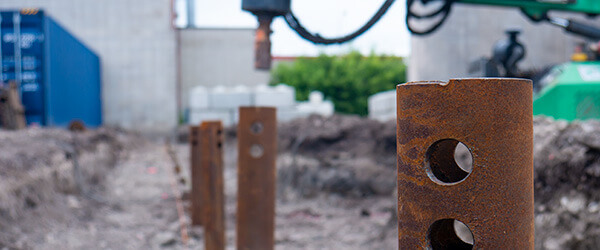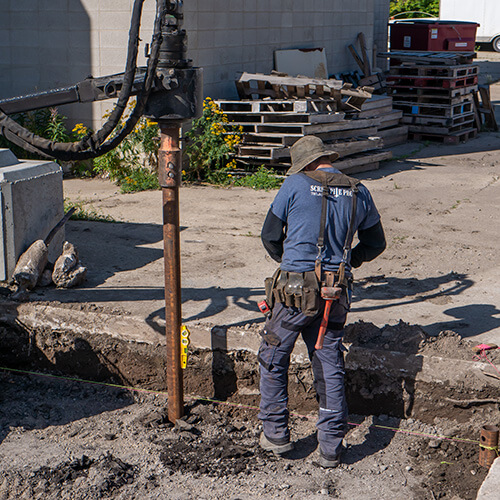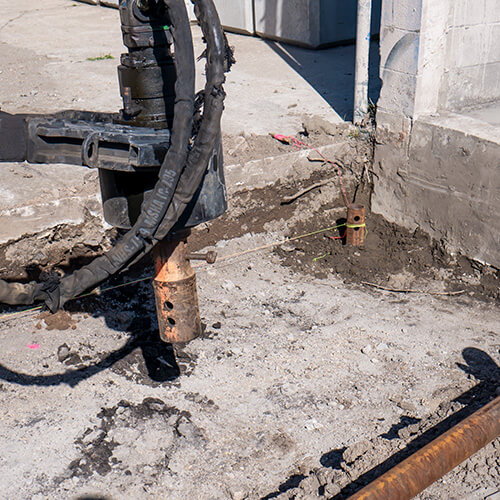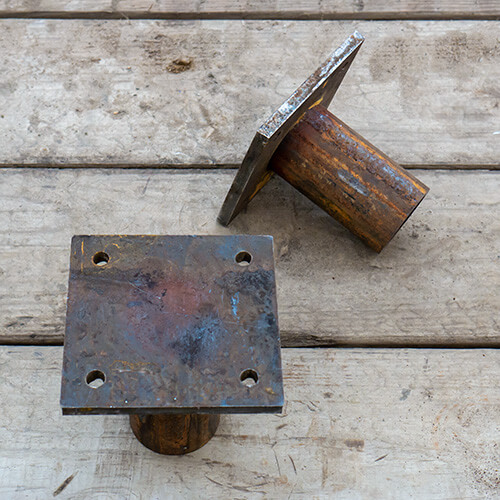Calgary Screw Pile Installation

Contact Us for a Quote Today
How are Helical Piles Installed?
The installation process is typically where a pile is screwed into the ground, either by pushing it in with the torque motor or by turning it with the drive head. As the pile is screwed into the ground, the helix plates on the pile grip and hold the soil, providing the pile with stability and support.
Screw piles are commonly used in construction projects where traditional excavation and poured concrete foundations are not feasible, such as in wet or unstable soil conditions, or in locations where access is limited. Because of Calgary’s extreme weather changes during the winter months, screw piles offer an optimal foundation for residential and commercial applications. They are also used for the foundations of buildings, bridges, towers and other structures.


Installation Process
Helical piles, also known as screw piles, are installed using specialized equipment, such as a torque motor or a hydraulic drive head, that rotates the pile as it is advanced into the ground. The equipment is typically mounted on a truck or a small excavator, and is used to screw the pile into the ground using a combination of torque and downward force.
The process continues by measuring the torque being applied to the pile by the installation equipment, and this torque values are then used to determine the pile’s capacity.
Screw Pile Caps
When the pile is fully installed, it is typically outfitted with a cap and bracket that can be used to attach the structure being supported. Then the structure is leveled and braced as required.
There are many different type of generic screw piles caps. These are commonly used to connect a piles shaft to a lumber built structure, a steel built structure or a concrete poured structure like a grade beam.
In special applications custom screw pile caps can be fabricated to support structures like signage or light poles.

Why a Screw Pile Pros Installation is Better
Proprietary Specially Designed Equipment
Exclusive to the Screw Pile Pros in Calgary and throughout Alberta is the implementation of a new screw pile machine that has never before been commercially available in the industry. Typically, installers of helical piles will use a retrofitted skid steer or excavator to instal helical screw piles. However, now there is a new screw pile machine that has been specifically designed and developed from the ground up for screw pile installation. At the Calgary Screw Pile Pros, not only do we use this new specialised installation equipment, but we have also been involved in the testing and development of this equipment during its prototyping. A better screw pile machine means a better installation from the Calgary Screw Pile Pros.
The Importance of Using a Specialized Drive Head for Screw Piles
There are several advantages to using a hydraulic drive head to install screw piles:
- Speed: A hydraulic drive head can install piles much faster than a torque motor, which can save time and labor costs on a construction project.
- Power: Hydraulic drive heads can generate much more torque and downward force than torque motors, which allows them to install piles more efficiently and in harder soil conditions without disturbing the soil.
- Control: With a hydraulic drive head, the operator has more precise control over the installation process, which allows them to make adjustments as needed to ensure that the pile is installed correctly and to the correct depth.
- Safety: Some hydraulic drive heads come with safety features such as automatic shut off if an obstacle is hit, which can help to prevent accidents and damage to the equipment.
In addition to these advantages, using a hydraulic drive head can be a good choice for larger, more complex, or deeper foundation projects.
CCMC and Alberta Building Code Compliant
In Canada, the installation of helical piles is governed by provincial and territorial building codes. These codes vary across the country and can change over time, so it is important for helical pile installers to be familiar with the specific regulations that apply in the area where they are working. Some provinces have specific requirements for helical pile installers, such as training or certification, while others do not. Not only do the Screw Pile Pros comply with the Alberta Building code but have also helped set the standard for helical pile installation in Alberta.
In Alberta, it is not mandatory for helical pile installers to be certified, but it is highly recommended. Alberta has a building code that requires the design and installation of helical piles to be done by a professional engineer and the installation of them done by an experienced installer who understands the installation process and the requirements of the building codes.
It’s always good practice to check with local authorities to understand the specific requirements in the area and ensure that the installer is trained and certified to meet the necessary standards before work begins. Not only do the Calgary Screw Pile Pros meet these requirements, but they also have professional engineering available to clients who require a stamped foundation design for their project. Employing engineering not only ensures that the minimal Alberta building code is met but, in many cases, exceeds it.
What are the Risks of NOT Conforming to CCMC and Alberta Building Code Standards?
The Canadian Construction Materials Centre (CCMC) is a national evaluation agency that evaluates and certifies construction materials, products and systems for use in Canada. The CCMC does not certify screw piles, but instead certifies the manufacturers of Helical Piles and Helical Anchors.
If a screw pile or helical pile product is not CCMC certified, it may not have been evaluated and tested to meet the required standards and guidelines for use in Canada. This can lead to several risks, such as:
- Safety hazards: Non-certified screw piles may not be able to withstand the loads and stresses they are designed to support, which can put the building and its occupants at risk.
- Structural issues: Non-certified screw piles may not be able to provide the level of support and stability required for the building or structure, which can lead to problems such as settlement or collapse.
- Legal issues: Building codes and regulations in Canada require that construction materials and systems meet certain standards. If a non-certified screw pile is used in a building project, the project may not be in compliance with these codes and regulations. This can lead to costly legal issues and fines for the contractor and property owner.
- Warranty: In case of defect or failure, a manufacturer’s warranty may not be honored if their product was not CCMC certified.
It is important to always ensure that the helical pile manufacturer is CCMC certified and that the installer you choose is familiar and experienced with the local regulations and codes, to minimize the risks and ensure that the project is completed safely, efficiently and up to the code.
